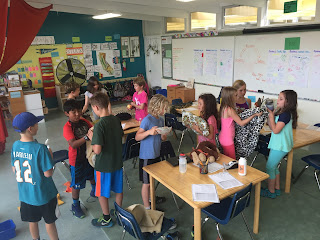Please save the date!
Team 3-4 Pecha Kucha Presentations
Friday, May 20th
2:00-3:00
Pecha Kucha, "chit-chat" in Japanese, is a presentation format through which presenters share their big ideas. Pecha Kucha presenters traditionally show 20 slides for 20 seconds each and narrate the images for the crowd. We have been watching strong sample presentations and we'll soon start to organize our own ideas into Pecha Kucha presentations. Our third and fourth grade-style Pecha Kucha will feature some changes to the format that we hope will make for an exciting, engaging event.
I hope that our wonderful families will be able to join us as the students present their hard work here in our classroom. See you there!
********************
We've started a daily practice of writing in our 5 Minute Journals. First thing in the morning we write three things we're grateful for, three things that we can do to make today great, and a daily affirmation. At the end of the day, we write three amazing things that happened that day and one thing that we could have done to make that day better.
We're slowly breaking down how and why the different elements of this journal help us feel happier, healthier, and more content. Tomorrow, we'll discuss how writing the things we're grateful for each morning connects to everything we've been learning about the brain. Gratitude stimulates the hypothalamus, the teeny part of your brain that directly influences sleep, eating, and stress among many other important functions. Gratitude also stimulates the part of the brain associated with the neurotransmitter dopamine- the 'do again' chemical- which is responsible for the creation of new learning pathways.
Goofballs!
In Social Studies we practiced bartering as more and more trading ships arrived in the harbors of Alta California.
As they read their silly cause and effect stories, students projected their illustrations on the board.
As we continue our Peaceful Warrior training, we're focusing on one important quality of the Peaceful Warrior: kindness. Our most important work has been in identifying the times when it's most difficult to be kind so we can be vigilant about our choices when we notice that we're in those challenging situations. We practice strategies for finding kind words when we're frustrated, impatient, or angry such as taking a "reset", trying our favorite deep breathing strategies, taking a break, using observations, not evaluations, and more.










